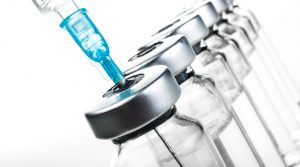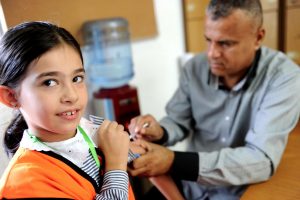Pediatricians in Palestine deal with concerns and diseases that are similar to those of many other pediatricians worldwide. And as in many other countries, concerns about prophylaxis are a priority for both Palestinian health care professionals and parents. Some of the most common questions that parents ask are about vaccinations. And whereas concerns about the possible side effects of vaccines take up increasing space in the ongoing worldwide discussions, in Palestine, concerns focus more on how we can protect children from disease, for example, by giving them the required vaccinations.
It is necessary to protect children from infections due to the often inadequate hygienic situation in Palestine, where produce may be exposed to insufficiently treated wastewater during irrigation, and rural areas and refugee camps frequently suffer from poor infrastructure with insufficient access to clean water. Access to water in the Palestinian territories is minimal compared to that of Israel, which controls the water sources. In part, it is also due to socio-economic and geopolitical conditions, as some parents may lack the education or the financial resources to seek immediate medical treatment in cases of emergency, and access to adequate health care may be difficult in remote areas due to lack of transportation, closed off roads, and checkpoints.
According to WHO reports, more than 90 percent of children in Palestine are vaccinated, which reflects good compliance in the area of pediatric primary health care. The vaccination schedule coincides with the program that is recommended for the follow-up of child growth and development at the age of 2, 4, 6, 12, and 18 months, when weight, head circumference, and length are measured. In addition, advice about iron prophylaxis is given to parents as soon as their child is 6 months old, and a complete blood count, CBC, is performed at the age of one year in order to assess the hemoglobin level, which is an important indicator of a child’s health. Studies have shown that anemia (a low hemoglobin level) can impair a child’s mental and physical development and health.
In Israel, a highly developed country, some diseases are making a comeback as more parents choose not to vaccinate their children for various reasons. While interaction between Israelis and Palestinians is generally very limited and restricted, the geographic proximity is nevertheless a concern, if only to serve as a precedent.
With the reappearance of these diseases come the health complications that caused doctors and health professionals to search for and develop the vaccines in the first place. Many of these diseases are not even feared so much for their primary symptoms but for the rather high percentage of cases where dangerous conditions may arise in association with the disease, possibly causing lifelong impairment, such as paralyses and organ damage, or even proving fatal.
Whereas worldwide discussions among parents generally center on the potential side effects of vaccinations, in Palestine – due to socio-economic and geopolitical conditions – parental concerns focus more on providing children with adequate protection against disease.
Notable is that in Palestine, two health care providers are responsible for the vaccination program and its supply. The Palestinian Authority Ministry of Health is responsible for the general population of the West Bank and Gaza Strip. UNRWA is responsible for Palestinians who have refugee status (and who carry a refugee card given by UNRWA). Refugees make up 41 percent of the Palestinian population, and many of them still live in refugee camps in the West Bank and Gaza Strip.
But let me present to you the concerns that are on the minds of most parents who come with their children to pediatric clinics.
“What vaccinations are included in the Palestinian vaccination program?”
Today’s Palestinian vaccination program, run by the Palestinian Ministry of Health, covers all obligatory vaccines recommended by the WHO for children up to the age of one year. It includes vaccinations against the hepatitis B virus, tuberculosis, diphtheria bacteria, tetanus, pertussis bacteria, haemophilus influenzae bacteria, the polio virus, pneumococcal bacteria, rotavirus, and the measles, mumps, and rubella viruses. In recent years, the rotavirus vaccine that protects people from diarrhea caused by rotavirus has been introduced into the Palestinian vaccination program because, according to 2009 WHO recommendations, it can be responsible for 37 percent of the deaths caused by diarrhea.*1
UNRWA vaccination program reaches 95 percent of Palestinian refugees. Photo courtesy of UNRWA.
“Are there other vaccines that I can give my child that are not included in the vaccination program of the Palestinian Ministry of Health?”
Increasingly, parents ask whether vaccines other than the ones included in the Palestinian vaccination program can be given to their child after the age of one year, and the answer is yes. The vaccine programs in some European countries and in the United States include two doses of the hepatitis A vaccine, given at age 18 and 24 months. The hepatitis A virus can cause liver inflammation, which is characterized by jaundice (a yellowing of the skin), abdominal pain, fever, vomiting, and a decrease in the function of the liver; this inflammation can last two to three weeks. Most cases (95 percent) resolve spontaneously and with full recovery of the liver function, but in some cases, it can lead to a chronic liver disease similar to hepatitis C and hepatitis B, and over time to end-stage liver failure. This virus is transmitted by dirty water (for example, by drinking unclean water or eating unwashed vegetables and fruits that have been watered by sewage-polluted water), which can be found in a number of Palestinian communities. It can also be transmitted directly from human to human if hands are washed with insufficiently clean water or not washed at all after using the toilet, which are also situations that can be found in some communities. I personally recommend that parents give the vaccine in order to protect their children from the disease, especially the younger ones whose hygiene habits are still not established.
Another vaccine that can be given at parents’ discretion protects children from the varicella virus, also known as chicken pox. It is a very common childhood disease that spreads at a high rate. It causes fever and malaise that are followed by a skin rash that develops into small fluid-filled pimples that spread all over the body and are accompanied by itching. In general, chicken pox is not considered a dangerous disease. It heals within two to three weeks, but the child must be isolated from other children (school, kindergarten) and from pregnant women because, in rare cases, it can cause serious brain inflammation and/or a serious lung infection in the fetus. It is important to note that if a woman who has never been infected by the chicken pox virus becomes infected during the first five months of pregnancy, the unborn baby could suffer from organ damage that may affect the brain, limbs, and eyes. Newborn babies whose mothers were infected one week before or after birth are at a high risk of developing an infection themselves and need medical attention. Concerned parents may feel reassured to know that a vaccine against chicken pox is available and can be given to children at any age after their first birthday and can be refreshed with a second dose within five years. Currently, efforts are being made to introduce the chicken pox vaccine into the official Palestinian vaccination program.
In Palestine, 38.6 percent of the population fall within the pediatric age group, which consists of children younger than 15 years of age.*4
“What about the flu shot? I heard that it reduces my child’s immunity.”
Because rumors about the seasonal influenza or flu vaccine abound, I would like to offer clarification: The influenza virus is one of many viruses that can cause upper and lower airway infections in children and adults. This virus is more common in winter and known to cause severe illness, especially in children and adults with known lung disease (such as asthma), heart disease, or an immune deficiency. Risk groups also include people above the age of 60, cancer patients, and diabetic patients. The influenza vaccine is changed every year in order to suit the most widespread types of influenza viruses because this virus can change its DNA very fast. For example, this year, a vaccine that includes four influenza strains (Influenza Type A H1N1, Influenza Type A H3N2, Influenza Type B Colorado, Influenza Type B Phuket) has been developed. Even though the vaccine provides protection from only 40 percent of the influenza viruses, risk groups are nevertheless recommended to take it because the influenza virus can cause a serious lung infection that will require hospitalization for some patients and can be fatal in others. The WHO tracks the spread of influenza monthly, and more information is available at the link below.*2
What confuses some people is that the influenza vaccine (flu shot) does not stop all winter viruses, it only protects from certain influenza viruses, and so a child or an adult who receives the flu shot might become infected by other viruses several times during the winter season. This does not mean that the flu shot does not work or that it impairs our immunity.
“I have heard that the measles virus is coming back.”
Despite the high vaccination rate in the Palestinian territories, our geographical closeness to Israelis may have brought us some measles cases. In recent years, Israeli citizens have not been committed to the vaccination program of the Israeli Ministry of Health, and many people have refused to be vaccinated or not let their children be vaccinated out of religious or ideological motivations. Some of these unvaccinated people were infected by the measles virus and have transmitted it to other people as well. Children from age one to nine years were mainly affected. In the Palestinian territories, 63 cases of measles were reported in 2017, but in the previous three years, only a few cases occurred. This year, a measles epidemic spread in Israel. By November 2018, there were 2,200 cases of measles reported; 90 percent of these patients had not been vaccinated, and 13 percent of them were admitted to the hospital.*3 The effectiveness of the measles vaccine, if given in two doses, is very high (97 percent). So if you and your child are vaccinated, you do not need to worry about becoming infected.
Parents who are concerned about their child’s vaccinations should refer to their child’s vaccination booklet, and any questions or concerns can be answered by a pediatrician or the closest public health center. The Palestinian Ministry of Health runs such centers in many neighborhoods in urban and rural areas, and mobile clinics visit Bedouin areas on a regular basis.
I wish all readers a safe winter.
For more information, please refer to UNICEF, The Public Health Supply Chain in the State of Palestine: A Tribute to Resilience, available at https://www.technet-21.org/iscstrengthening/media/attachments/2017/11/06/51497-1—unicef-national-capacity-development—palestine—web.pdf.
*1 Alice J. Abou Nader et al., Global rotavirus vaccine introductions and coverage: 2006-2016, US National Library of Medicine, Human Vaccines and Immunotherapeutics, 2018, available at https://www.ncbi.nlm.nih.gov/pmc/articles/PMC6183203/.
*2 A monthly update of influenza spread worldwide is available at http://www.emro.who.int/pandemic-epidemic-diseases/influenza/influenza-monthly-update-november-2018.html.
*3 Israeli Ministry of Health, November 2018; see also, Kristin Hugo, “Measles outbreak NYC: What you need to know about the highly contagious disease,” The Independent, October 18, 2918, available at https://www.independent.co.uk/news/world/americas/measles-outbreak-nyc-2018-symptoms-treatment-medication-why-new-york-children-a8590891.html.
*4 Annual health report by the Palestinian Ministry of Health, 2017.





